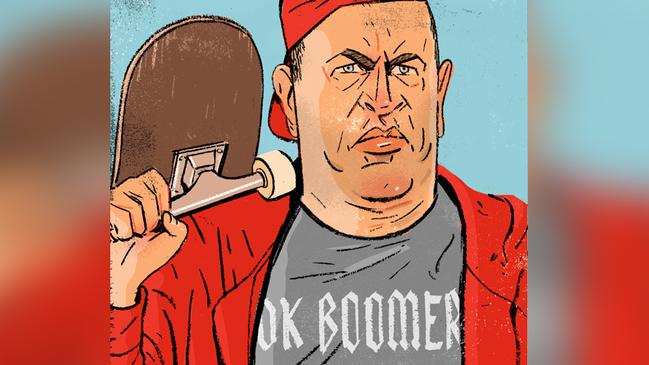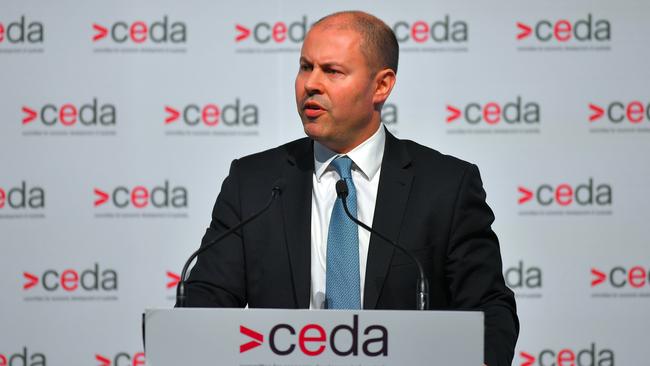
It’s particularly your fault because there are so many of you, creating an unfavourable demographic bulge. You lot have retired too early or plan to. You won’t retrain to stay in the workforce. You are sitting around in houses you bought cheaply and that are too big for you but you refuse to move.
You are excessively pampered by receiving the Age Pension and a variety of tax concessions, paid for by the young’uns. You are a drain on society by seeking quality healthcare. You are even responsible for low interest rates and poor productivity.
It may not have been the intention of Josh Frydenberg to join this pile-on but the speech he delivered to the Committee for Economic Development of Australia last week hasn’t helped.
The Treasurer noted “as more Australians live longer, the number of working-age Australians for every person aged over 65 diminishes. Whereas in 1974-75 it was 4.5 to one, it’s now estimated over the next four decades to fall to just 2.7 to one.”
READ MORE: No point in homing in on Age Pension asset test | Defusing fiscal time-bomb will be an age-old question | Scott Morrison plays down Josh Frydenberg is pushing older Australians to ‘work until you drop’
Let’s get real: four decades is a long way off. Most of us are more concerned about what happens in the next four years, maybe a decade. The thing about the economic impact of ageing is that it’s not dramatic.
It’s probably fair for Frydenberg to point out that “as our ageing population puts pressure on our health, aged care and pension systems, we need to develop policies that respond effectively to this challenge”. But that’s where some of his arguments fall down.
Evidently, baby boomers must work even longer. And they have been, a point he acknowledges.
“The participation rate of those aged 65 and over has increased from 12.3 per cent to 14.6 per cent over the last five years. The participation rate for this cohort was less than 6 per cent 20 years ago.”
Apparently that’s not good enough. Frydenberg then quotes a figure that is clearly wrong: “Australians in work currently undertake 80 per cent of their training before the age of 21.”
The bureaucrat who wrote this sentence clearly doesn’t understand the world of work and continuous learning or the extension of most people’s university training well into their 20s.
The point Frydenberg is trying to make is that older Australians need to undertake skills retraining to stay in the workforce. I’m not sure this is an attractive or sensible policy direction.
Been a nurse for 40 years? Evidently you need to train to be a fly in, fly out driver in mining. Been a sparky for 45 years? You can always become a disability service worker. And where precisely are all these jobs for older workers?
The Treasurer is surely working on the wrong side of the decimal point with this messaging.
If the baby boomers are not sufficiently offended by the Treasurer’s remarks, another angle of attack is that older citizens are responsible for interest rates being so low, even though these low rates hurt them as they are overwhelmingly net savers.

The economic argument is that the increase in savings caused by an ageing population leads to a fall in the natural interest rate as the supply of loanable funds rises relative to the demand. The natural rate of interest is one that supports an economy operating at its maximum potential output without increasing the rate of inflation.
When the working age population shrinks, relatively speaking, that potential output is reduced, which also reduces the natural interest rate.
Christopher Kent, assistant governor of the Reserve Bank, has added to this list of ageing woes by pointing out that “older people tend to be less willing to take on risks, including those associated with new business ventures, developing new products and services, and pursuing innovation more generally”.
For these reasons, “ageing could weigh on productivity growth and hence on our incomes and economic wellbeing”.
Why the Treasurer would be raising the ageing issue at this stage is anyone’s guess.
After all, the next Intergenerational Report prepared by Treasury is not due until next year. It is then we will see the latest scenarios on the implications of the ageing population.
I doubt there are many votes in mentioning the role immigration may play in offsetting the effects of an ageing population, a topic covered briefly in Frydenberg’s speech. The Productivity Commission has shown conclusively that immigration cannot play a significant role, in part because the migrants themselves age.

This point was reinforced by Kent: “This (immigration) effect is already in operation given the significant contribution to Australia’s population growth from immigration over recent years. Also, with populations ageing globally, immigration cannot be a panacea for all economies.”
In this context it’s easy to feel suspicious about the newly established Centre for Population within Treasury. According to the blurb, the centre will provide “data and policy analysis to support Australia’s economic growth; ensure the liveability of our cities and ongoing strength of our regions; achieve a more optimal settlement pattern and ensure Australia remains united and together as a people.” (That last objective sounds like complete gobbledygook, you’ll agree.)
Given Treasury’s endless promotion of high rates of immigration, the output of this centre will likely emphasise the positives and gloss over the costs — let’s not forget most of the costs are borne by the states and territories, rather than by the commonwealth.
So what have the baby boomers ever done for us?
Apart from caring for children and grandchildren, investing in education and training, working hard and saving, dealing with difficult economic times, serving their country in military service and contributing to communities, I guess the answer is — nothing.
The smart political move would be to emphasise the positives of having lots of people in their 60s and older, keen to assist their families, friends and communities, rather than bleat about the costs of Australians ageing.
Setting up a clash of the generations is very unlikely to produce good public policy. The jarring effect could just leave everyone feeling disaffected.




For anyone born between 1945 and 1964, the megaphone message du jour is: it’s all your fault.